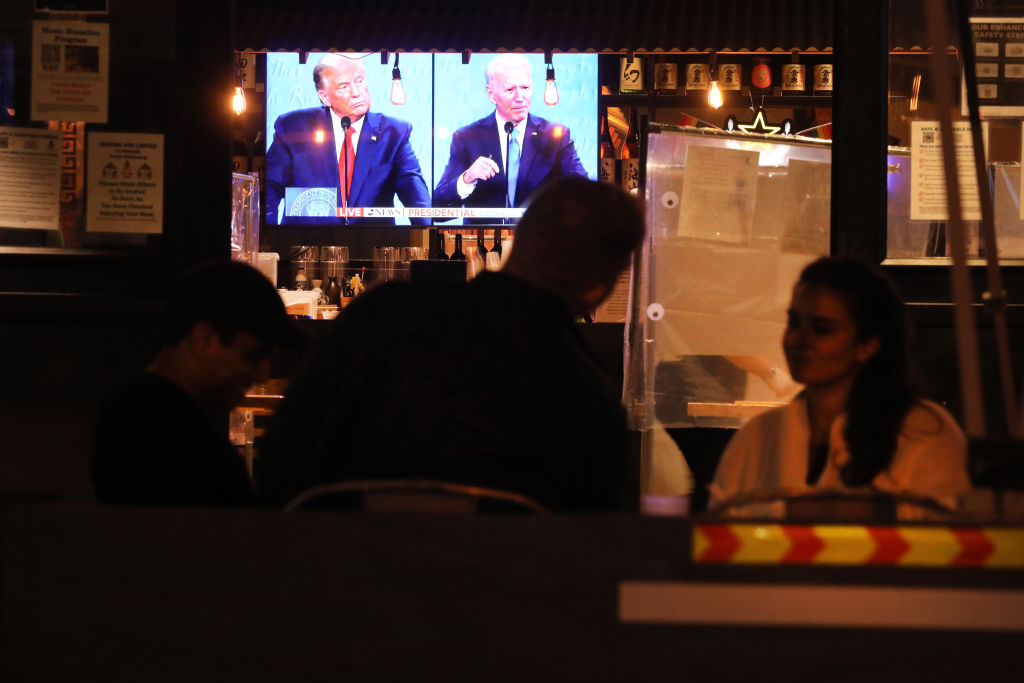Republicans still have trouble believing former Vice President Joe Biden will take the stage in the first presidential debate tonight. Democratic political insiders are petrified of the match up and, despite all the prep and role play, appear to be on pins and needles. What will be the tell of a good debate performance? Here are a few elements to consider.
Nonverbal Warfare
 Some of the most memorable moments in presidential debate history can be put into the category of body language: George H. W. Bush looking at his watch, Trump “stalking” Hillary Clinton on stage, Al Gore approaching George W. Bush and getting a “you really want to have at it” look from Bush. If you go back as far as the first televised debate, the five o’clock shadow and the sweat pouring off Richard Nixon didn’t serve him well, either.
Some of the most memorable moments in presidential debate history can be put into the category of body language: George H. W. Bush looking at his watch, Trump “stalking” Hillary Clinton on stage, Al Gore approaching George W. Bush and getting a “you really want to have at it” look from Bush. If you go back as far as the first televised debate, the five o’clock shadow and the sweat pouring off Richard Nixon didn’t serve him well, either.
Studies show that body language makes up a whopping 55% of the communication loop while someone’s tone of voice carries 38%. Spoken words – the verbal part – only account for 7% of a person’s understanding. In other words, we all listen with our eyes.
Nonverbal communication includes body language, gestures, facial expressions, and touch. Scowling and rolling your eyes at an opponent can work against you in a debate. Shifting and leaning is a sign of nervousness, and the force and pitch of your voice can serve as “tells” that you are angry, annoyed, or uncomfortable. For example, Hillary Clinton tended to raise the pitch of her voice when she was rattled, and it became irritating to the listener.
The Psych Game
Who will be the first to try to get under the skin of the other? Many have speculated that it would be President Trump, but with all the debate prep under his belt, it is entirely possible that Joe Biden will be the one to come out swinging. The president is notoriously thin-skinned when attacked and tends to go on defense quickly. Mr. Biden knows that he will have the most energy at the get-go, and as such, he’s smart to try to get Trump on his heels in the first part of the debate.

(Photo by Spencer Platt/Getty Images)
Whether to front-load or back-load your best stuff is another element that matters in a presidential debate. While Biden is likely to front-load – when he’s got the adrenaline pumping – Trump may be saving his best jabs and hooks for the end when he feels his opponent might be running out of steam. The only problem with that approach is that television is a medium made for front-loading. As time goes on, people start tuning out – not just figuratively, but literally. They might find themselves bored and reach for the clicker. So, saving your best stuff for last may have consequences.
Risk and Reward Strategies
Even though verbal communication only makes up 7% of the listeners’ understanding, a candidate still needs to watch his words. Viewers get uneasy when there is name-calling, general rancor, and when one debater can’t keep his mouth shut and constantly interrupts his or her opponent. On the other hand, the public tends to reward a candidate who can work some humor and quips into the dialogue. A textbook example of this was in 1984 during the Reagan-Mondale debate. When asked if he was too old to be president, Mr. Reagan deadpanned: “I will not make age an issue of this campaign. I am not going to exploit, for political purposes, my opponent’s youth and inexperience.” Even Democratic opponent Walter Mondale couldn’t suppress a laugh at Mr. Reagan’s ability to turn an awkward question to his advantage.
The format of this debate may favor Mr. Biden. The candidates will be “socially distanced,” and only a small audience will be attending. If, as many suspect, Biden is battling some level of dementia-related cognitive decline, a quiet, well-ordered tableau goes to his advantage. President Trump tends to gain energy from a broad and raucous audience. Whether they boo or applaud is not the point for Trump – it’s the extrovert in him that causes him to feed off a live audience. Still, the president can overcome this by playing off what he’s got to work with – even 90 people are better than none for Trump.
While this is only one of three debates, it is still crucial for both candidates to put their best foot forward. As Reagan demonstrated in what has been historically considered a sluggish debate performance against Mondale in 1984, the first debate can catch the incumbent off balance. This is because the challenger – in this case, Biden – has already taken the debate stage many times during this year’s primary season. Still, Reagan proved that an incumbent could recover in future debates. However, with the widespread concern that the former vice president may beg off the second and/or third encounters, it may all come down to this one event in a winner take all scenario.
~
Read more from Leesa K. Donner.



